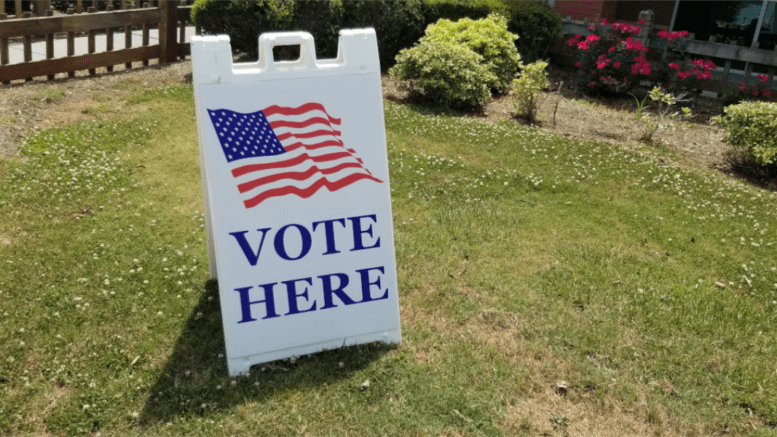by Jill Nolin, Georgia Recorder [This article first appeared in the Georgia Recorder, republished with permission]
June 7, 2022
Georgia Republicans competing in congressional primary runoffs doubled down on restricting access to abortion and protecting existing gun laws in the wake of mass shootings at a New York grocery store and Texas elementary school that have reignited the national debate on gun violence.
But a new voting issue has also emerged in the two runoff races featuring candidates endorsed by former President Donald Trump, who has blasted the higher than usual number of crossover votes cast in last month’s primary. Some Trump-aligned candidates are now calling for changes to how voters cast ballots in primary elections.
All six Republican candidates who made it to the June 21 primaries participated in Monday’s Atlanta Press Club debates at Georgia Public Broadcasting in Midtown Atlanta. Voters return to the polls this month to pick their GOP nominees for District 6 northwest of Atlanta, District 10 in east Georgia and District 2 in southwest Georgia.
“I’m not out in any way to reduce folks from voting at a party primary of their choice,” said Jake Evans, an attorney who is running in the 6th congressional district. “What I’m out for is ensuring Republicans elect Republicans that will represent them, that Democrats don’t infiltrate, manipulate, influence our elections, which is what happened two Tuesdays ago.”
In Georgia, voters do not declare party affiliation and there is no party registration. An analysis by the Atlanta Journal-Constitution found that about 67,000 people voted in the Democratic primary two years ago cast a ballot in the Republican primaries this year.
But it’s unclear how many of these voters may have been independent-minded swing voters as opposed to Democrats trying to influence the outcome of the GOP primary. There were also fewer high-profile contests on the Democratic ballot this year.
Even so, some conservatives are now pushing for a party registration system that would give voters a deadline to change their party affiliation ahead of a primary contest. Any such long-shot change would have to be made by the state Legislature.
Evans’ rival Rich McCormick, an emergency room doctor, is less convinced the fixes being floated would change anything – or that any crossover voting gave him a boost. He racked up the most votes last month with 43% in the nine-way contest but fell short of the 50% threshold needed to avoid a runoff.
“We finished 20 points ahead of my opponent. It didn’t matter if the Democrats are involved or not,” McCormick quipped.
In the 10th District, the top vote-getter, trucking executive Mike Collins, finished with about 26% of the vote to Jones’ nearly 22%.
Jones, a former Democratic state lawmaker, held a press conference Monday morning with two conservative politicians: incoming state Sen. Colton Moore and state Rep. David Clark, who just ousted House caucus chair Rep. Bonnie Rich.
“Even if there’s one that voted with the intent of tainting another party’s primary, that’s one too many,” Jones said.
In Southwest Georgia, Republicans Jeremy Hunt and Chris West are in the running for a chance to challenge longtime Democratic Congressman Sanford Bishop of Albany. The district’s recently redrawn lines make the seat slightly more competitive, and the two swapped barbs Monday over who would be best suited to take on Bishop.
Guns and abortion
As talks continue in Washington on possible gun safety legislation, Georgia congressional candidates staked out no-compromise stances at the Atlanta Press Club debates Monday.
“I am 100% adamant that the Second Amendment is written right. There is no changing it,” Collins said. “We do have problems. We don’t have a gun problem. What we have is a cultural problem where we have removed God from every facet of our life, be it from the schools, from prayer, even television. That’s where we’ve got to get back to where the sanctity of life means something.”
Collins, Jones and McCormick also say they favor banning abortion. Evans said he supports outlawing the procedure in all cases except when the life of the mother is imperiled.
A leaked draft suggested the U.S. Supreme Court may be on the verge of overturning Roe v. Wade and letting states set their own limits, and an official opinion is expected this month.
“I am unapologetically for ensuring that we maintain the sanctity of human life and aggressively fight against a culture of death,” Evans said.
McCormick argues he knows of no scenario that would justify an exception for abortion when the mother’s life is at risk, saying it’s “a false premise that everybody likes to drop because it sounds so drastic.”
He dismissed ectopic pregnancies as an example because he says the fetus would not survive anyway.
“Obviously if the mother dies, the baby dies too,” McCormick said to reporters after Monday’s debate. “That is not an abortion. That is a procedure, a medical procedure to save the mother, the baby will never be born.”
As a Democratic lawmaker, Jones voted against Georgia’s anti-abortion law in 2019 but now says he did so because he didn’t think the measure – which bans abortion in most cases after about six weeks – went far enough.
Georgia Recorder is part of States Newsroom, a network of news bureaus supported by grants and a coalition of donors as a 501c(3) public charity. Georgia Recorder maintains editorial independence. Contact Editor John McCosh for questions: info@georgiarecorder.com. Follow Georgia Recorder on Facebook and Twitter.
